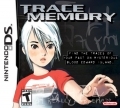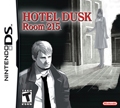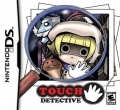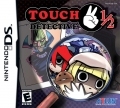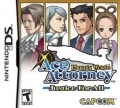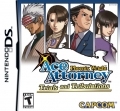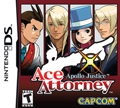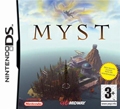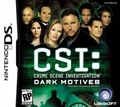Adventure gaming beyond the PC: Nintendo DS
First posted on 25 March 2008. Last updated on 24 July 2009.
For decades, the PC has been the dominant platform for the release of adventure games. With less and less classic adventure games being released nowadays for the PC, another platform for adventure games has emerged: the Nintendo DS. In this article, I shall focus on adventure gaming beyond the PC by giving an overview of adventure games available for the Nintendo DS.
It is instructive to understand that it is in the nature of Nintendo's portable handheld design which makes the Nintendo DS an ideal platform for playing adventure games. As a gaming device, the Nintendo DS offers possibilities that make it a lot more interesting to play adventure games on than other gaming consoles. Of these, the most important innovation is the touchscreen which, when in use, resembles closer to navigating with a mouse on the PC than any other console input peripheral. In adventure gaming, a lot of selecting or manipulating needs to be done onscreen in order to interact with the game. By using the stylus on the touchscreen, this becomes an easy task (especially compared to the traditional joypad). Furthermore, the Nintendo DS has dual screens that are very handy for playing adventure games. This is because the lower screen can be used to display the map or the inventory (or both), while the upper screen can be devoted entirely to display the main game scene. Such setup gives a clear overview of what you are doing at all times, as it is no longer necessary to scroll through a lot of menus each time you have to interact with the game.
With some game titles such as Hotel Dusk: Room 215, the Nintendo DS can be held sideways for a better gaming experience. Even the entire device itself can be involved in the interaction. For example, if you need to get a stamp somewhere, it is very well possible that you have to close your Nintendo DS for a second! In addition, the built-in microphone of the Nintendo DS can be used by adventure games that include puzzles in which you have to blow or yell into the device. As with other gaming consoles, saving your game is easy on the Nintendo DS. However, compared to the PC, only a limited number of game save slots is available due to the size restriction of the solid-state memory supported by the device. This means that you must delete older game saves before you can store newer saves. Nonetheless, the Nintendo DS makes for an ideal alternative to the PC as a platform for adventure gaming. Of course, given that the Nintendo DS has not been around as long as the PC, the number of adventure game titles available in its library is far fewer than the number available on the PC.
Let us take a look at the adventure games currently available for the Nintendo DS.
Trace Memory, Hotel Dusk: Room 215
Trace Memory (also known as Another Code: Two Memories) and Hotel Dusk: Room 215 (also known as Wish Room: Angle's Memory) are both developed by the Japanese studio Cing. As such, both games are very similar in style which relies heavily on text. In Trace Memory (2005), you have to uncover clues to a family's dark secret. In Hotel Dusk: Room 215 (2007), you assume the role of Kyle Hyde, an ex-cop turned salesman who is trying to track down a missing friend. The story is situated in Los Angeles 1979 and it is up to you to unravel the mystery behind your friend's disappearance. Both games make use of Nintendo DS's unique capabilities to solve puzzles. These include the touchscreen, the microphone, the dual screens, and even the clamshell case that makes it possible to push the screens together. The gameplay in these titles is very alike, except that you have to hold the Nintendo DS like a book (sideways) when playing the latter. Hotel Dusk: Room 215 is also much longer than the relatively short Trace Memory.
Touch Detective, Touch Detective 2 1/2
This popular series is developed by the Japanese studio BeeWorks. In Touch Detective (2006), you assume the role of Mackenzie, a little girl who inherits the family business after her father unexpectedly passes away. The business happens to be a renowned detective agency. With the aid of her investigative assistant Funghi and her faithful servant Cromwell, Mackenzie sets off to prove herself worthy of being called a Touch Detective. Using the stylus, you can guide Mackenzie through crime scenes, talk to witnesses, and discover new evidence. The dual screens enable you to simultaneously view clues, maps, and the inventory during your investigation. In Touch Detective 2 1/2 (2007), so named by the developer to signal that it is more than just a straightforward sequel, Mackenzie has been accepted into the Great Detective Society and is now a fully accredited sleuth. The series is known for its wacky and weird humor. Both games can be controlled entirely by the stylus. Unfortunately, neither makes extensive use of the other capabilities on the Nintendo DS.
Phoenix Wright: Ace Attorney, Phoenix Wright: Ace Attorney - Justice For All, Phoenix Wright: Ace Attorney - Trial and Tribulations, Apollo Justice: Ace Attorney
Developed by Capcom, Ace Attorney is actually a port of the Japanese game series Gyakuten Saiban originally released on the Nintendo Game Boy Advance. Set in 2016, all the games in this series are "court of law" adventures written in a comical anime style. In the original Phoenix Wright: Ace Attorney (2005), you assume the role of a defense attorney named Phoenix Wright, who must prove his seemingly guilty client's innocence, no matter how dire the circumstances may seem. In each game, you have to collect evidence, weed through inconsistent testimonies, and overcome corrupt agendas to ensure that justice will prevail. You use the touchscreen interface to progress through the game. In addition, you can make use of the microphone to yell out "Objection!" or "Hold it!" as you cross examine your witnesses during the trial. Unlike the original, the sequels Phoenix Wright: Ace Attorney - Justice For All (2006) and Phoenix Wright: Ace Attorney - Trial and Tribulations (2007) also feature the "Psyche-Lock" system in which you have to break down tough witnesses with a series of correct questions and then catch them on inconsistencies in their answers. The fourth game in the series, Apollo Justice: Ace Attorney (2008), features Apollo Justice instead of Phoenix Wright as the main protagonist. It is the first game in the series developed specifically for the Nintendo DS.
Myst
Myst is, of course, well known to fans of the adventure genre, so it is not too surprising that the game has been ported by Hoplite Research (not Cyan, maker of the original Myst) to the Nintendo DS. What makes this port of Myst (2007) unique, however, is the fact that the Nintendo DS version is the first cartridge based release of the game: all other releases have been on CD-ROM. Unfortunately, the dual screens of the Nintendo DS are a little too small to offer a decent gaming experience, to the extent that additional tools have been added by the developer to a sort of inventory that includes a magnifying glass to make the text (in the linking books) easier to read on screen. Movement is also a lot quicker across screens. This port includes the Rime Age from realMyst that is not part of the original Myst. Otherwise, the game plays exactly the same as the 1993 original released on the PC. Fans who have never played this classic but have patience to do so may want to give it a try on the Nintendo DS.
CSI: Dark Motives
CSI: Dark Motives (2007), also known as CSI: Crime Scene Investigation - Dark Motives, is a port of the PC game of the same name, based on the popular American television series CSI: Crime Scene Investigation. The game is ported by Powerhead Games (not 369 Interactive, maker of the original title). In the game, you join a member of the Las Vegas CSI team, such as Gil Grissom, to help solve crimes by using realistic forensic techniques and lab equipments. There are 5 cases to solve, and all of them make use of the interactive touchscreen. Again, the stylus does a good job of replacing the mouse control. However, a lot of the materials from the original have been lost in the conversion to a single cartridge for the Nintendo DS. The graphics are not quite so good, and all the spoken dialogs have been lost. Still, like the original, the port manages to capture the feel of the series. This is a game that only hardcore fans of the television drama will want to check out.
Spinoffs...
Lastly, there are a number of adventure game spinoffs available for the Nintendo DS.
Lost in Blue (2005) and Lost in Blue 2 (2007), sequels to the Survival Kids series for the Nintendo Game Boy Color, are a mix of role-playing games and adventure games. The series is developed by KCE Hawaii of Konami Digital Entertainment. You play as a kid who has to survive on a deserted island while simultaneously uncovering the island's many mysteries.
Professor Layton and the Curious Village (2008) is the first title of a planned trilogy in the Professor Layton series developed by Japanese studio Level 5. In this game, you follow Professor Hershel Layton and his young assistant Luke to the village of St. Mystere (how appropriate) to solve the mystery hidden in a dead man's will. The game offers a mixture of classic adventure puzzles and popular brain training mini games. The sequels, tentatively titled Professor Layton and Pandora's Box and Professor Layton and the Last Time Travel, have already been announced in Japan.
The spinoffs share many similarities with traditional adventure games, but the gameplay is distinct from the classic point-and-click style that defines the genre.

